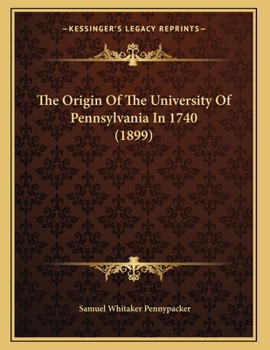The Origin Of The University Of Pennsylvania In 1740 (1899)
Select Format
Select Condition 
Book Overview
The Origin of the University of Pennsylvania in 1740 is a historical book written by Samuel Whitaker Pennypacker in 1899. The book provides a detailed account of the establishment of the University of Pennsylvania, one of the oldest and most prestigious universities in the United States.Pennypacker's book covers the period from the university's founding in 1740 to the early 19th century, exploring the political, social, and cultural context in which the institution was created. The author examines the various factors that led to the establishment of the university, including the growing demand for higher education in the American colonies, the influence of religious institutions, and the role of prominent figures such as Benjamin Franklin.Through extensive research and analysis, Pennypacker provides a comprehensive overview of the university's early years, including its initial struggles and successes, its evolution from a small college to a major research institution, and its impact on the development of higher education in the United States.Overall, The Origin of the University of Pennsylvania in 1740 is an insightful and informative book that sheds light on the history of one of America's most renowned universities. It is a valuable resource for historians, educators, and anyone interested in the evolution of higher education in the United States.This scarce antiquarian book is a facsimile reprint of the old original and may contain some imperfections such as library marks and notations. Because we believe this work is culturally important, we have made it available as part of our commitment for protecting, preserving, and promoting the world's literature in affordable, high quality, modern editions, that are true to their original work.
Format:Paperback
Language:English
ISBN:1167155114
ISBN13:9781167155116
Release Date:September 2010
Publisher:Kessinger Publishing
Length:28 Pages
Weight:0.26 lbs.
Dimensions:0.1" x 8.5" x 11.0"
Customer Reviews
0 rating





